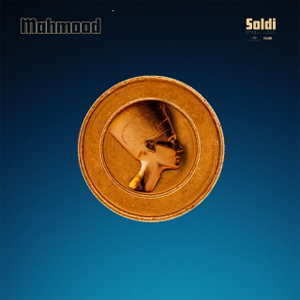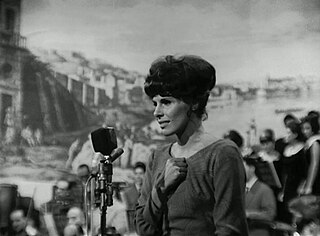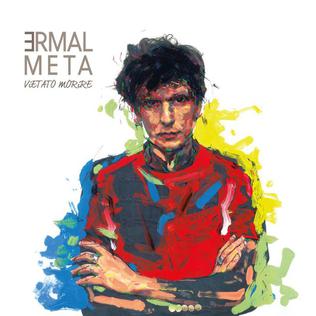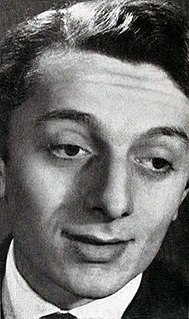
Domenico Modugno was an Italian singer, songwriter, actor, guitarist, and later in life, a member of the Italian Parliament. He is known for his 1958 international hit song "Nel blu dipinto di blu", for which he received Grammy Awards for Record and Song of the Year. He is considered the first Italian cantautore.

"Nel blu, dipinto di blu", popularly known as "Volare", is a song recorded by Italian singer-songwriter Domenico Modugno. Written by Franco Migliacci and Domenico Modugno, it was released as a single on 1 February 1958.

Mia Martini was an Italian singer.

"Soldi" is a song recorded by Italian singer Mahmood. It was released on 6 February 2019, as the fifth single from his debut studio album, Gioventù bruciata (2019). Mahmood co-wrote the song with Dario "Dardust" Faini and Charlie Charles, who also produced it.

Emanuela Trane, better known by her stage name Dolcenera[ˌdoltʃeˈneːra], is an Italian singer, songwriter and actress. She rose to fame in 2003, after winning the newcomers' section of the Sanremo Music Festival, but she achieved commercial success in Italy only in 2005, when she won the music-based reality show Music Farm and she released her second album, Un mondo perfetto. In 2005 she was also awarded Best New Artist of the Year at the Italian Meeting of Independent Record Labels and she received the De André Award for Best Emerging Artist.

Franco Califano was an Italian lyricist, composer, singer-songwriter, author and actor. During his career Califano has sold about 20 million records.

Marco Mengoni is an Italian singer-songwriter. He rose to fame in 2009, after winning the third series of Italian talent show X Factor. His debut extended play, Dove si vola, was preceded by the single with the same title, which reached the top spot of the Italian Top Digital Downloads chart and also served as his coronation song. Marco Mengoni is 188 cm tall.

The Sanremo Music Festival 2009 was the 59th annual Sanremo Music Festival. It was held at the Teatro Ariston in Sanremo, province of Imperia, during the five nights between 17 February 2009 and 21 February 2009, and it was broadcast by Rai 1. Tha last night of the show was also broadcast live by RTV21 in Albania, RTK in Kosovo and RSI in Switzerland.

The Sanremo Music Festival 2008 was the 58th Sanremo Music Festival, held at the Teatro Ariston in Sanremo. The first and the second night of the show were held on 25 and 26 February 2008, while the last three nights were held from 28 February and 1 March 2008.

Michele Zarrillo is an Italian singer-songwriter. He is mainly known for hits such as "Una rosa blu", "Cinque giorni", L'elefante e la farfalla and "La notte dei pensieri". In 1987 he won the Sanremo Music Festival, competing in the newcomers' section. Zarrillo took part in the competition several other times, the last time in 2017 with the song "Mani nelle mani" . He took part in Sanremo's competition 12 times, but only won once, as stated above.

The Festival della Canzone Napoletana, commonly known as the Festival di Napoli, is a Neapolitan song contest. The first edition was held in 1952 and the last in 2004. From 1952 to 1970 the show was broadcast on RAI and from 1998 to 2004, in a differently spirited version, by Rete 4.

"Il cuore è uno zingaro" is a song composed by Franco Migliacci (lyrics) and Claudio Mattone (music). The song won the twenty-first edition of the Sanremo Music Festival, with a double performance by Nicola Di Bari and Nada. It had been initially planned to be performed by Di Bari and José Feliciano. The Di Bari's version peaked at first place for six weeks on the Italian hit parade.

Gaetano Cristiano Rossi, best known as Christian, is an Italian singer, mainly successful in the first half of the 1980s.
Mariella Nava, stage name of Maria Giuliana Nava is an Italian singer-songwriter and composer.
Maurizio Fabrizio is an Italian composer, conductor, arranger, producer, musician and singer-songwriter.

"Ma che freddo fa" is a 1969 song composed by Claudio Mattone (music) and Franco Migliacci (lyrics). The song premiered at the 19th edition of the Sanremo Music Festival with a double performance of Nada and The Rokes, placing at the fifth place. The first verses include a citation of Donovan's "Laléna". Nada's version was a massive success, selling about one million copies, mainly in the Italian and Spanish markets.
"Chiamami ancora amore" is a song by Italian singer-songwriter Roberto Vecchioni, written by Vecchioni himself, together with Claudio Guidetti, which also produced the track. The song won the 61st Sanremo Music Festival, also receiving the "Mia Martini" Critics' Prize, and the Press, Radio and TV Award.

Vietato morire is the second studio album by Albanian-Italian singer-songwriter Ermal Meta, released in Italy on 10 February 2017 by Mescal and distributed by Artist First.

















